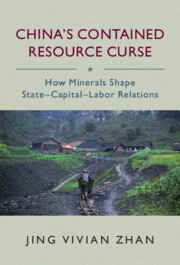Book contents
- China’s Contained Resource Curse
- China’s Contained Resource Curse
- Copyright page
- Dedication
- Contents
- Figures
- Tables
- Acknowledgments
- Abbreviations
- 1 Minerals and the State–Capital–Labor Triad
- 2 Minerals, Capital, and Local Economic Development
- 3 Resource Extraction and Victimization of Labor
- 4 Resources and Local State Capture
- 5 Resources and Local Public Goods Provision
- 6 Coping with the Resource Curse
- References
- Index
2 - Minerals, Capital, and Local Economic Development
Published online by Cambridge University Press: 24 March 2022
- China’s Contained Resource Curse
- China’s Contained Resource Curse
- Copyright page
- Dedication
- Contents
- Figures
- Tables
- Acknowledgments
- Abbreviations
- 1 Minerals and the State–Capital–Labor Triad
- 2 Minerals, Capital, and Local Economic Development
- 3 Resource Extraction and Victimization of Labor
- 4 Resources and Local State Capture
- 5 Resources and Local Public Goods Provision
- 6 Coping with the Resource Curse
- References
- Index
Summary
Chapter 2 opens with a description of mineral resource distribution and the development of mining industries in reform-era China. It then examines the impacts of resource endowment on local economic development, with a focus on capital accumulation and investment. Through qualititative studies on mining entrepreneurs and statistical analysis on Chinese provinces, it shows that resource boom in general benefits capital by not only boosting capital accumulation in the mining industries but also generating positive spillover effects on other industrial sectors, especially those labor-intensive ones. However, resource-generated capital tends to impede the investment in high-tech industries and induce speculative investment in real estate, which may discourage industrial upgrading and undermine economic growth in the long run. Therefore, resource boom has rather mixed effects on local economic development.
Keywords
- Type
- Chapter
- Information
- China's Contained Resource CurseHow Minerals Shape State Capital Labor Relations, pp. 38 - 75Publisher: Cambridge University PressPrint publication year: 2022

